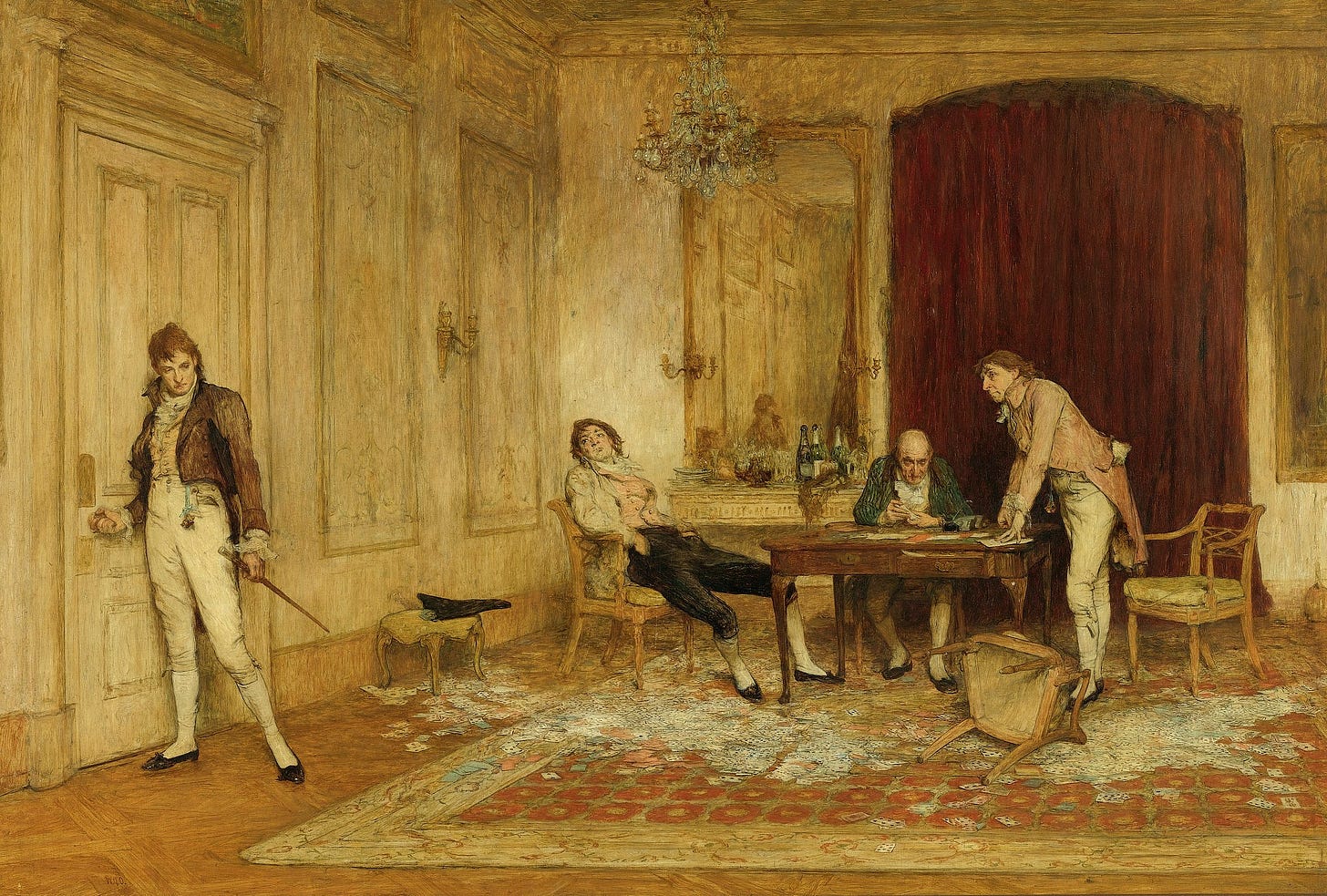I have been ready for another burst of short fiction inspired by art.
As ever, my generous (and culturally adept) friend Harry's Meanderings offered a thought-provoking suggestion (Enigma by William Quiller Orchardson). As Orchardson was an unfamiliar name to me, I had a rummage around, learning about his Scottish roots and his art education in Edinburgh. I really like Enigma and I see a story in the set-up of the painting. I am also drawn to his depictions of an unhappy marriage (check out The First Cloud, as an example).
Hopefully, Harry will forgive me a slight detour into the intrigue of Hard Hit, if I promise to return to Enigma.
McQuinlan is no gentleman but he is occasionally required to behave like one. He has been in service to the Hoare family for long enough to know that in banking there is a fine line between flattery and fisticuffs.
These Thursday night card games test his patience, never more so than when young Lord Percy deigns to join Sir Arthur Hoare as he has this evening. Perhaps it is Queensberry’s insouciance, perhaps it is the rate at which his friend Viscount Chelsea is losing his inheritance, but the mood is sourer than the Spanish sherry the old man serves less-favoured guests.
He had felt the atmosphere change. The impetuosity of youth, and the slow drip of insults from the sneering lips of the young man now draped over the back of the parlour chair. Contemptuously flicking his winning hands onto the oak table, Lord Percy verbally jabbed at the other players like a pugilist fighting to his father’s rules.
McQuinlan had no time for Queensberry’s style of boxing. Fights were supposed to be brutal, free from constraints. Move fast, sneak in the nasty shots, and catch them unawares. Bites, scratches, gouging, surreptitious low blows. Rules in fighting are not for him.
Cards though, that’s a different matter.
There are rules for a reason. Order demands skill, reasoning, and brain power. Take away the rules and there’s no pleasure to be taken in outwitting the entitled aristocratic lambs who present themselves to be fleeced.
He learned his card playing the hard way in grubby gin bars, losing coins he couldn’t afford to fritter away. He made up his losses in bare-knuckle prize fights where the heavily-muscled physique that had since kept order for the Hoare family attracted the attentions of a different kind of whore. Even in the cold grip of poverty, there was always a warm bed to welcome him and loose change to pilfer.
His reputation used to be enough but age diminishes the strong as well as the weak. Slippery, obnoxious, over-confident toffs like Queensberry could call on the protection of the strong men currently fighting for gentlemen’s purses and their ladies’ favours. McQuinlan’s best days were in the past. Viscount Chelsea did not know of him. The banker’s enforcer fixed his resentful dead-eyed stare at the foppish young man who had flipped the parlour chair as he flounced away from the table.
No words passed between Sir Arthur and his loyal hound but the once-prized fighter bristled on behalf of the man who kept him in coins and whose largesse extended to a warm bed high in the rafters of this elegant townhouse. Occasionally, if the mood struck, McQuinlan would press one or two coins on a compliant housemaid to buy her company and her silence about his ‘preferences’. But that would be for later when the bloodlust had abated slightly.
Before then, he would follow this mincing young waste of space into one of the darker corners of Whitechapel he was known to frequent and set upon him without restraint. The cane the young Viscount is clutching in his ineffectual, sweaty grip would elicit pathetic squeals for mercies that McQuinlan had never shown. In the days that followed, the Cadogan family would settle his debts to Sir Arthur’s satisfaction and the errant viscount would be removed to the country to nurse his wounds and hide their shame.
He felt his excitement mount. Patience, McQuinlan, patience.



I love it. A wonderfully dark interpretation of a piece of art begging for a story to be told.
Mincing young waste of space....great line, as are so many of the others. You sure have a skill for this!! 🙏